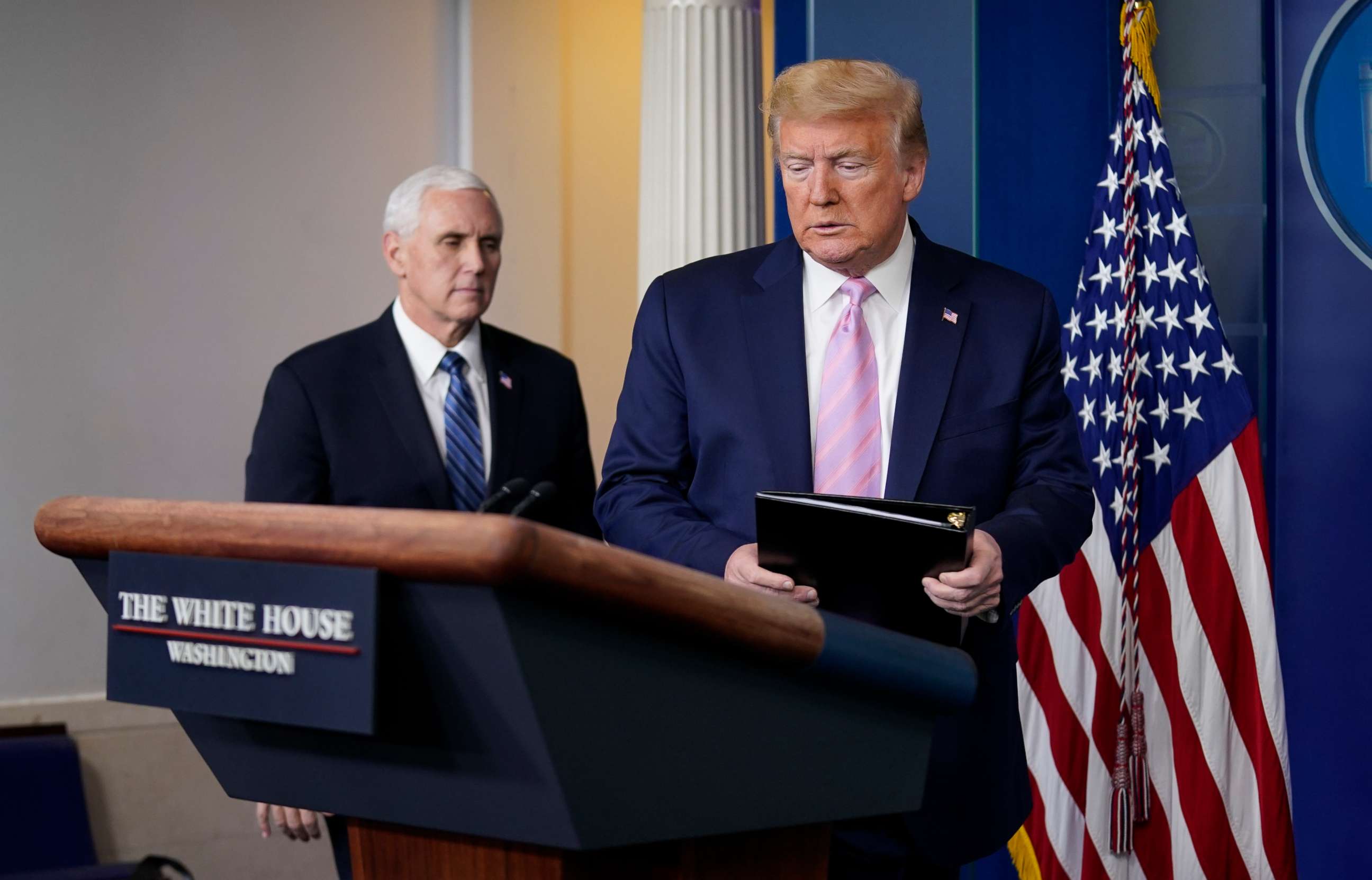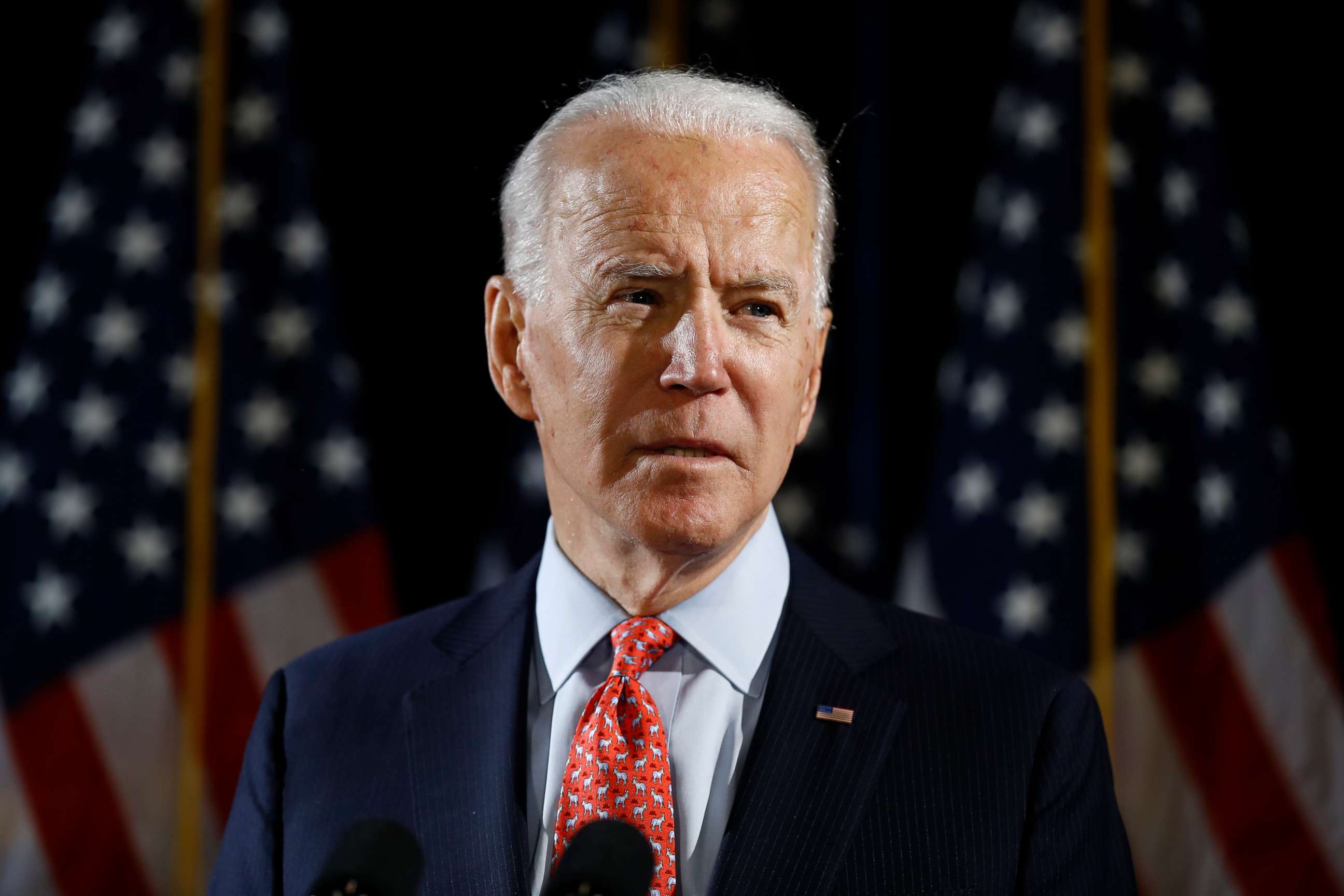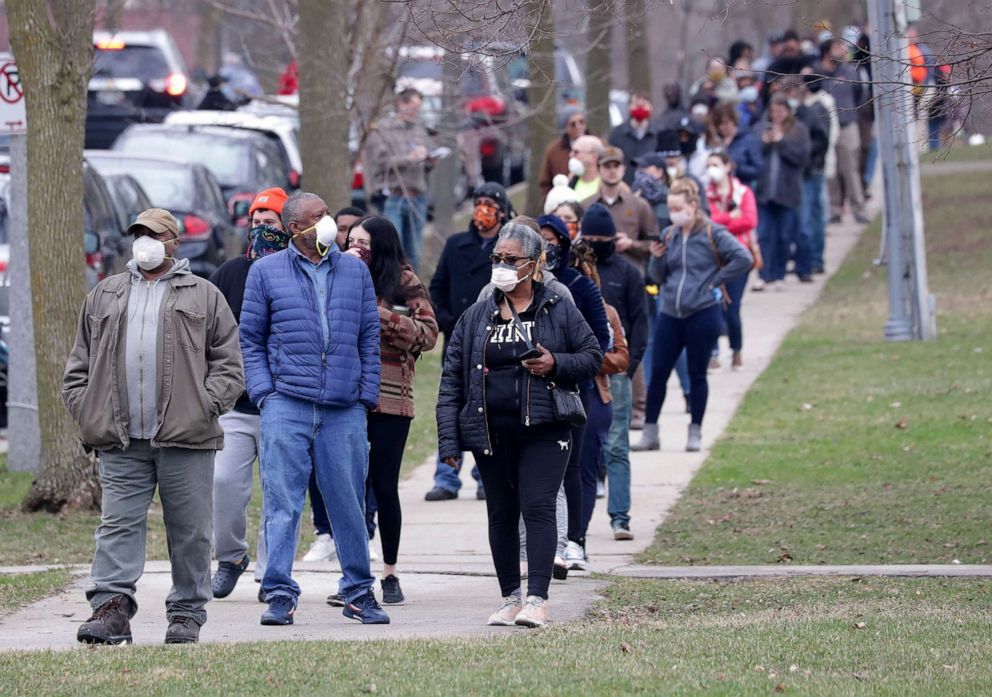The Note: Trump weighs 'instincts' against facts as biggest COVID-19 decisions may still lie ahead
Curves may be flattening, though nothing appears much closer to opening.
The TAKE with Rick Klein
Easter has come and gone. Curves may be flattening, though nothing appears much closer to opening.
New details are pouring out about missed signals and missed opportunities in confronting COVID-19 more aggressively. Yet it’s still possible that President Donald Trump’s leadership will be judged less on what he did or didn’t do before than on what he chooses to do from this point forward.
Trump’s claims notwithstanding, governors are making clear that the federal response still isn’t where it needs to be.

“To say that everybody's completely happy and that we have everything we need -- it's not quite accurate,” Maryland Gov. Larry Hogan, a Republican and chairman of the National Governors Association, said on ABC’s “This Week.”
Even with another brutal week expected, the president is openly deliberating when and how to try to bring the economy back to life. He’s getting pressure from corporate leaders and on his political right, as a remarkable op-ed from two Trump loyalists from over the weekend makes clear.
“The economic calamity lies largely with the origination of policies resulting from [Dr. Anthony] Fauci's recommendations,” GOP Reps. Andy Biggs and Ken Buck wrote in the Washington Examiner. “Fauci is a respected healthcare professional, who has contributed a great deal to his country. But he can no longer be one of the primary voices in this crisis, especially not after his assertion that the economic effects and devastation from this shutdown are merely inconvenient.”
Fauci on Sunday conceded that earlier COVID-19 mitigation efforts -- along the lines that he and other medical professionals advised -- would probably have saved lives. That’s not an acknowledgement that’s likely to endear Fauci to Trump.
The president now will have what he’s calling “the biggest decision I’ve ever had to make,” amid conflicting advice from his medical team and business leaders and advisers. There’s room for experts there, he says, but there’s also more than that.
“It's going to be based on a lot of facts and instincts,” Trump said on Fox News over the weekend.
The RUNDOWN with MaryAlice Parks
Former Vice President and presumptive Democratic presidential nominee Joe Biden wrote an op-ed over the weekend laying out the steps, as he sees them, that the country would need to take relax social distancing guidelines and get many people back to work.

"This isn’t rocket science; it’s about investment and execution," he wrote, describing the need for testing to determine who has already been infected with the coronavirus and has antibodies.
The rest of what he laid out was not ingenious either. It was a series of rather lofty and undefined goals, many of which would be extremely hard to realize. "Perhaps offices and factories will need to space out workers and pursue other solutions to lessen risk of spread of the virus on the job. Restaurants may need new layouts, with diners farther apart,” he wrote.
Economics is a social science and right now it is hard to imagine people sitting in a restaurant if they feel nervous.
That part, the psychology of this all, is something Biden clearly understands. His ideas listed together, though maybe hypothetical and lacking details, at least looked like a roadmap. And even an unbelievably challenging or "hard to conceive of" roadmap can feel more comforting than the perception of none at all.
In a crisis, Americans want to know what the next step is.
The TIP with Kendall Karson
Nearly a week after Wisconsin voters were faced with risking their safety to cast a ballot in last week’s election, results from the contest are finally expected to be released Monday starting at 4 p.m.
At the presidential level, the Wisconsin race was supposed to be another signal of strength for the general election in a key battleground, but now, only six days later, the results won’t matter too much for the primary. Former Vice President Joe Biden is now the presumptive nominee, after Vermont Sen. Bernie Sanders, the last contender standing in his way of the nomination, bowed out last week.

But in a proxy battle between Wisconsin Democrats and Republicans -- who were bitterly feuding over how to run the voting leading into election day -- an all-important state Supreme Court race has become nationalized. Trump backed the conservative Justice Daniel Kelly, who was appointed by former Republican Gov. Scott Walker, and is facing a competitive challenge for his seat on the bench from Jill Karofsky, who was endorsed by both Biden and Sanders.
The stakes are high, with the state’s highest court overseeing a significant case about the purging of the state’s voter rolls, and already weighing the final decision to move forward with an in-person election that put voters in the position of deciding between their health and their vote in the first place.
THE PLAYLIST
ABC News' "Start Here" Podcast. Monday morning’s episode features ABC News’ Trevor Ault, who tells us what the latest coronavirus numbers are revealing about when parts of the country could reopen. Then, ABC News Senior Editorial Producer John Santucci examines the various warnings President Trump received, but reportedly did not act on in January and February. And, ABC News Legal Contributor Kate Shaw discusses how various civil liberties are being tested through COVID-19 restrictions. http://apple.co/2HPocUL
WHAT YOU NEED TO KNOW TODAY
- ABC's "The View" broadcasts its March 24 episode with former Vice President Joe Biden.
- Vice President Mike Pence leads a video teleconference with governors on COVID-19 response at 11:30 a.m. and leads a White House Coronavirus Task Force meeting at 3 p.m.
- Members of the White House Coronavirus Task Force hold a press briefing at 5 p.m. in the White House.
Download the ABC News app and select "The Note" as an item of interest to receive the day's sharpest political analysis.
The Note is a daily ABC News feature that highlights the day's top stories in politics. Please check back tomorrow for the latest.


